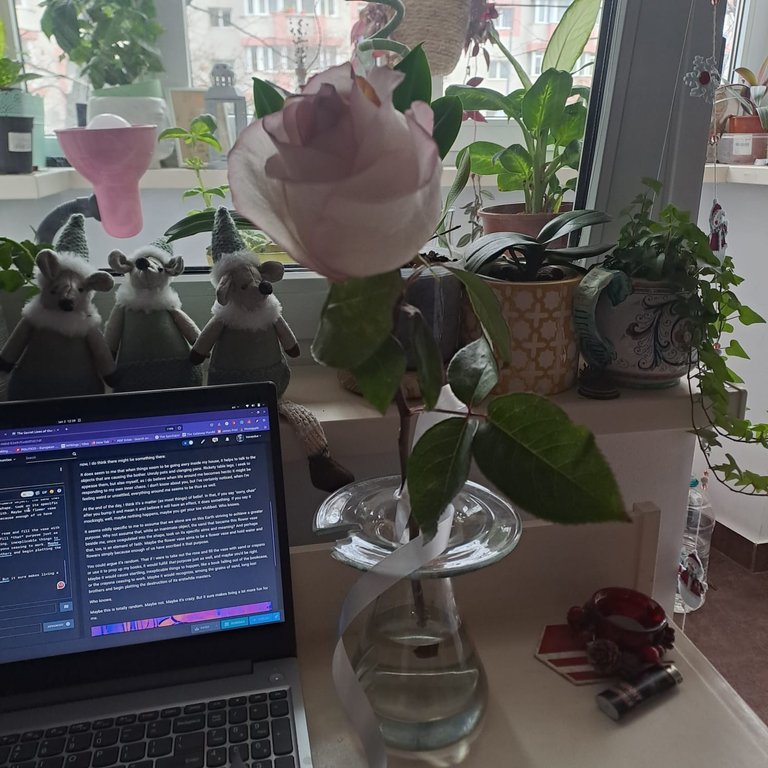A speaker to things
I have almost a problem with antropomorphism (personification? But then, I do really believe in the qualities ascribed...). It drives my brother up the wall. Maybe it's how I was raised - my mum does it too, my whole family, really - and it's certainly not tempered by my over-active imagination. I give personalities to the things around me. Seemingly random objects in the house get entire stories, feelings, stances on things.
It makes letting go of things very hard.

I had to change my laptop, since it wasn't just the charger that gave up on me after all. I mean, it still works but has all sorts of signs of wonkiness which make me think it's not long for this world. Besides, it was high time and since it ties so crucially into what I do, I figured okay. Finding out that the book I'm currently working on wasn't as I thought saved anywhere else, and it almost dying on me the other day certainly added an extra bit of spice to it, and the decision was made. Still. I find it hard. When the new one arrived this morning, I apologized to the old one. I even explained that this wasn't goodbye, but merely a division of tasks. It knows the drill. It was once the other laptop, too.
I feel better knowing that great people like Carl Jung used to do the same thing. Not only did he talk to his household items, but Jung believed our stuff actually has an independent existence with its own wills and worries. According to Jung, it's not at all unreasonable to assume that if an object behaves oddly, a devil has gotten into it, it is in some way cross and you should apologize to it. Sounds a lot like voodoo nonsense, doesn't it? I'm tempted to say the same, and yet, Jung was certainly not a thinker to be easily dismissed. And having tried to do things his way for a little while now, I do think there might be something there.
It does seem to me that when things seem to be going awry inside my house, it helps to talk to the objects that are causing the bother. Unruly pots and clanging pans. Rickety table legs. I seek to appease them, but also myself, as I do believe when life around me becomes hectic it might be responding to my own inner chaos. I don't know about you, but I've certainly noticed, when I'm feeling weird or unsettled, everything around me seems to be thus as well.
Of course, this notion goes back way beyond Jung. Several cultures in Earth's history believed that objects were animated by a certain energy, and that one ought to treat one's stuff with respect and kindness. That if they did so, the objects would in turn treat them kindly and even perhaps act as boons or talismans. It is a notion that in an increasingly consumerist easy-replacement culture is quietly disappearing. And, if these old beliefs hold any truth to them, it's doing so to our detriment.
At the end of the day, I think it's a matter (as most things) of belief. In that, if you say "sorry, chair" after you bump it and mean it and believe it will have an effect, it does something. If you say it mockingly, well, maybe nothing happens, maybe you get your toe stubbed. Who knows.
It seems oddly specific to me to assume that we alone are on this Earth striving to achieve a greater purpose. Why not assume that, while an inanimate object, the sand that became this flower vase beside me, once coagulated into the shape, took on its specific aims and meaning? And perhaps that, too, is an element of faith. Maybe the flower vase aims to be a flower vase and hold water and flowers simply because enough of us have ascribed it that purpose.
You could argue it's random. That if I were to take out the rose and fill the vase with sand or crayons or use it to prop up my books, it would fulfill that purpose just as well, and maybe you'd be right. Maybe it would cause startling, inexplicable things to happen, like a book falling out of the bookcase, or the crayons ceasing to work. Maybe it would recognize, among the grains of sand, long lost brothers and begin plotting the destruction of its erstwhile masters.
Who knows.
Maybe this is totally random. Maybe not. Maybe it's crazy. But it sure makes living a lot more fun for me.

I'm guilty of similar behavior, personifying objects, and always chalked it up to being sentimental. Since becoming a not-always-so-successful practicer of minimalism around 2015 I've tended to put a lot of research and thought into the things I buy and tend to develop a history with those things. I tend to associate those physical objects with memories of experiences I've had with them -- almost like an old friend. I can't imagine living any other way. Sometimes our imaginations can be the best form of magic.
It's a romantic view of things for sure. I think this could be a big problem with robots though. It will be so easy to see them as humans that many people will forget they are still objects after all
'The only way to have a friend is to be one' - Ralph Waldo Emerson | Wonderful share 🤝
You only look human. Unlock your super powers. Aquarius Academy 🐬